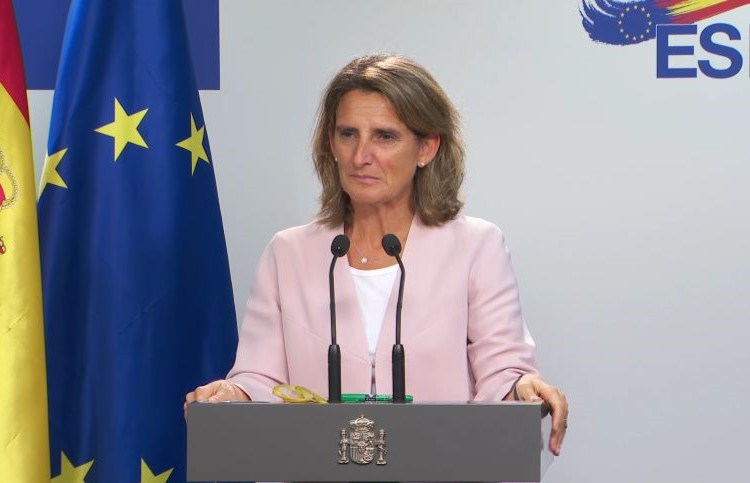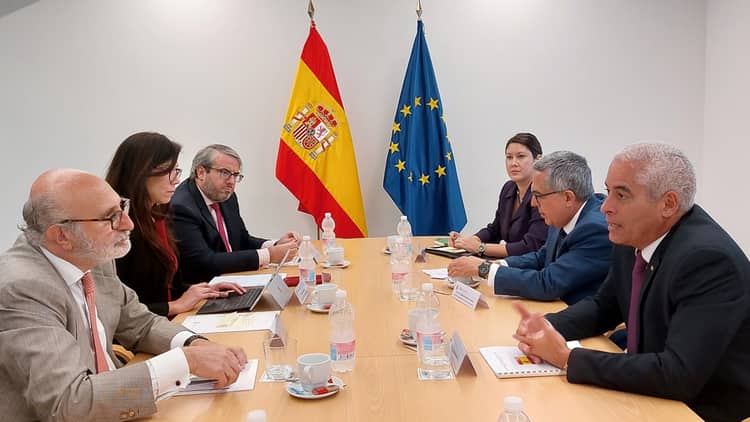The Diplomat
The Third Vice President and Minister for Ecological Transition and Demographic Challenge, Teresa Ribera, yesterday took advantage of her speech before the Extraordinary Council of Transport, Telecommunications and Energy of the EU to call for the reinforcement of “those infrastructures” necessary to facilitate gas connections, in clear allusion to the MidCat pipeline, rejected by France.
“We believe it is important to articulate measures around price limitations at European level and the functioning of the markets, the increase of the negotiating power of the Member States and the EU or the approach of those infrastructures that can be reinforced to be prepared for the winter 2023/2024”, said Ribera before her counterparts, gathered in Brussels to address the rise in gas prices in the current context of the Russian invasion of Ukraine and the energy sanctions against Moscow. At the press conference following the Council, the minister insisted on the need to “evaluate the best way to strengthen our infrastructures” with a view to the coming winter.
The Vice-President also called for “urgent and exceptional” measures on the European electricity market because European legislation “is not prepared” to deal with situations of stress, and warned that the actions at Community level have arrived “late” and that yesterday’s debate should have taken place a year earlier “to avoid the spectacular cost of energy that we now have in Europe”.
Last Monday, the president of France, Emmanuel Macron, expressed his rejection of MidCat on the grounds that the two current gas pipelines between Spain and France (the Irun and Larrau-Calahorra) are already used at 53% of their capacity and make it unnecessary to tackle a third interconnection project. “We are not in the process of saturating the existing connections and there is no need for Spain to export its gas capacities to France,” he declared.
The French leader made these statements during a press conference following a videoconference with the Chancellor of Germany, Olaf Scholz, dedicated to the energy situation of both countries. Precisely, Scholz himself and the President of the Government, Pedro Sánchez, last week showed their support for the MidCat project, which has been paralyzed for years due to its high costs and the low price of the Russian supply. There are 226 kilometers of pipeline to be built from the Catalan town of Hostalric to the French town of Barbaira and Spain is asking the EU to cover the costs.
On Tuesday, during the press conference after the Council of Ministers, Teresa Ribera announced that she would raise in Brussels a proposal regarding infrastructures and defended the need for infrastructures such as MidCat in an “exceptional” moment like the present, while recalling that Spain is in favor that the pipeline could also be used in the future to transport green hydrogen. He also recalled that MidCat is included in the annex of important infrastructures of the RepowerEu plan, which “was adopted by the heads of state and government at the proposal of the European Commission before the summer”.
On the same day, the European Commission’s energy spokesman, Tim McPhie, avoided commenting on the issue, arguing that “any additional cross-border infrastructure project linking the Iberian peninsula with the rest of the European Union needs further assessment by the countries involved and the project promoters, so the Commission cannot take a position”.
In this respect, the vice-president declared the following day, during an event organized by the newspaper Infolibre, that “there is a point of incoherence” in that, at the same time that “Europe stresses that it is essential to use the infrastructures in a more intelligent way and to use all the complementarities” in the name of “European interest”, the Commission itself chooses “not to participate in this debate on what is European interest and how to solve the technical or financial problems that may exist and leave it to the decision of one or two countries”.







